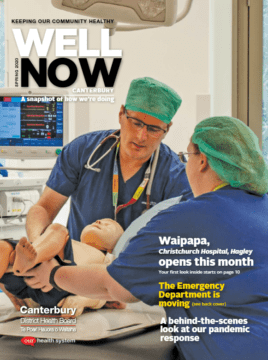Monday 16 November 2020WellNow Canterbury Magazine2 minutes to read
 WellNow Canterbury is our community health magazine that goes to every mailbox in Canterbury and the Chatham Islands twice a year. This ‘A Snapshot of How We Are Doing' doing edition demonstrates how we are meeting the Health Quality & Safety Commission’s requirements that DHBs give an account for the quality of their services, providing a snapshot of how our health system is meeting Canterbury’s health needs, and showcases our
WellNow Canterbury is our community health magazine that goes to every mailbox in Canterbury and the Chatham Islands twice a year. This ‘A Snapshot of How We Are Doing' doing edition demonstrates how we are meeting the Health Quality & Safety Commission’s requirements that DHBs give an account for the quality of their services, providing a snapshot of how our health system is meeting Canterbury’s health needs, and showcases our
work to improve services and standards of care.
How we measure up
This online-only version of WellNow also features a How we measure up section, charting our performance against the national health targets, the quality and safety markers as set by the Health Quality & Safety Commission, and other key measures.
Highlighted stories
Waipapa (Christchurch Hospital Hagley) opens in November 2020: Take a ‘walk’ through some of the highlights, in pictures.
Te Whare Whetū (House of Stars): The health benefits of reconnecting Māori health consumers with their whakapapa
A programme run by and predominantly for Māori, Te Whare Whetū helps people explore their whakapapa (cultural identity), build important links with their whānau and community, and improve their mental health.
Canterbury joins the National Bowel Screening Programme: Over the next two years 90,000 people aged from 60-74 years will receive a free bowel screening test kit in the mail. All they need to do is complete the test and return it in the packaging provided. During its first year alone, the programme will detect bowel cancer in 100 people who didn’t know they had it, enabling it to be treated earlier and with a much better chance of a good health outcome.
You can read the full online magazine in two different formats:
View on issuu.com Download PDF (5MB)
Back to Health News

